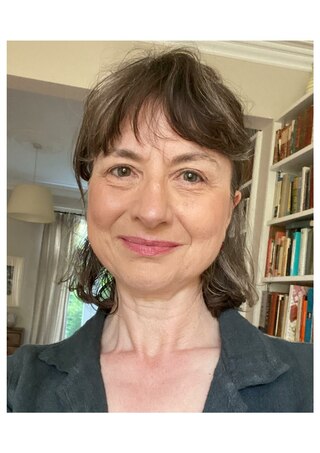John Conington was an English classical scholar. In 1866 he published his best-known work, the translation of the Aeneid of Virgil into the octosyllabic metre of Walter Scott. He was Corpus Professor of Latin at the University of Oxford from 1854 until his death.

Simon David Goldhill is Professor in Greek literature and culture and fellow and Director of Studies in Classics at King's College, Cambridge. He was previously Director of Centre for Research in the Arts, Social Sciences, and Humanities (CRASSH) at the University of Cambridge, succeeding Mary Jacobus in October 2011. He is best known for his work on Greek tragedy.
Robin Grimsey Osborne is an English historian of classical antiquity, who is particularly interested in Ancient Greece.
Elaine Fantham was a British-Canadian classicist whose expertise lay particularly in Latin literature, especially comedy, epic poetry and rhetoric, and in the social history of Roman women. Much of her work was concerned with the intersection of literature and Greek and Roman history. She spoke fluent Italian, German and French and presented lectures and conference papers around the world—including in Germany, Italy, the Netherlands, Norway, Argentina, and Australia.
Emma Wilson, is a British academic and writer, specialising in French literature and cinema. She is Professor of French Literature and the Visual Arts at the University of Cambridge and a fellow of Corpus Christi College.

Gian Biagio Conte is an Italian classicist and professor of Latin Literature at the Scuola Normale Superiore of Pisa.
Don Paul Fowler was an English classicist.
Gail Trimble is a British academic specialising in Latin poetry and literary form. She was captain of the Corpus Christi College team for the BBC television programme University Challenge in 2009 and scored a high proportion of the team's points. While her team won the challenge, they were subsequently disqualified after it was found that one of her teammates had finished his studies while the show was being recorded. Trimble has continued to appear on quiz programmes. She is now a fellow and tutor in Classics at Trinity College, Oxford.
Timothy John Guy Whitmarsh, is a British classicist and Regius Professor of Greek at the University of Cambridge. He is best known for his work on the Greek literary culture of the Roman Empire, especially the Second Sophistic and the ancient Greek novel.
John Richard "Jaś" Elsner is a British art historian and classicist, who is Professor of Late Antique Art in the Faculty of Classics at the University of Oxford, Humfry Payne Senior Research Fellow in Classical Archaeology and Art at Corpus Christi College, Oxford, and Visiting Professor of Art History at the University of Chicago. He is mainly known for his work on Roman art, including Late Antiquity and Byzantine art, as well as the historiography of art history, and is a prolific writer on these and other topics.
Catherine Elizabeth Wannan Steel, is a British classical scholar. She is Professor of Classics at the University of Glasgow. Steel is an expert on the Roman Republic, the writings of Cicero, and Roman oratory.
Alison Ruth Sharrock is an English Classics scholar. She has been Professor of Classics at the University of Manchester since August 2000. In 2009, she gave the Stanford Memorial Lectures. Together with David Konstan of Brown University, she edits the series Oxford Studies in Classical Literature and Gender Theory published by Oxford University Press.
The Corpus Christi Professorship of the Latin Language and Literature, also known simply as the Corpus Christi Professorship of Latin and previously as the Corpus Professorship of Latin, is a chair in Latin literature at Corpus Christi College, University of Oxford. The chair was created after the Oxford University Act of 1854.

Stephen Harrison is a British classicist and a professor of Latin at the University of Oxford. He has published widely on the poetry of Virgil and Horace.

Emily Joanna Gowers, is a British classical scholar. She is Professor of Latin Literature at the University of Cambridge and a Fellow of St John's College, Cambridge. She is an expert on Horace, Augustan literature, and the history of food in the Roman world.
Jennifer Ann Moss, was a British scholar of French literature and classical reception, specialising in the French Renaissance. She was Professor of French at the University of Durham from 1996 to 2003. In retirement, she became a lay minister in the Church of England.
Susanna H. Morton Braund is a professor of Latin poetry and its reception at the University of British Columbia.

Patrick Gerard Cheney is an American scholar of English Renaissance Literature. He is Edwin Erle Sparks Professor of English and Comparative Literature at the Pennsylvania State University.
Edward John Kenney, usually known as E. J. Kenney, was a British Latinist who served as the Kennedy Professor of Latin until his retirement in 1984. Specialising in transmission and textual criticism, he was considered a leading expert on the work of Ovid and Lucretius. He spent the majority of his career at Cambridge University, where he was an emeritus fellow of Peterhouse until his death in 2019.

Corynaeus is the name of one or more characters in Virgil's Aeneid (29–19 BCE). The first mention of Corynaeus in the poem is as a follower of Aeneas, who performs funerary rites for Misenus. Characters of the same name are then specified both as being killed by an archer, and later fighting in the final battle. This apparent contradiction is often explained by defining them as two separate characters.






